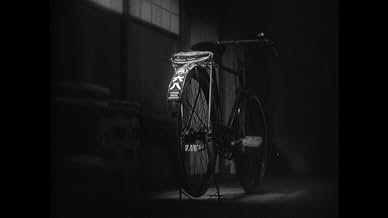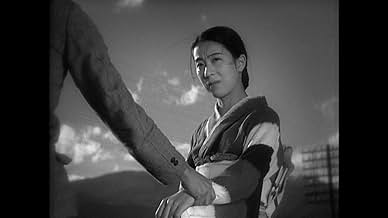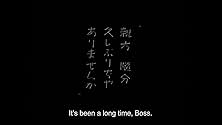IMDb RATING
7.6/10
3.6K
YOUR RATING
A kabuki actor's mistress hatches a jealous plot to bring down her lover's son.A kabuki actor's mistress hatches a jealous plot to bring down her lover's son.A kabuki actor's mistress hatches a jealous plot to bring down her lover's son.
- Awards
- 1 win
Kôji Mitsui
- Shinkichi
- (as Hideo Mitsui)
Emiko Yagumo
- Otaka
- (as Rieko Yagumo)
Chishû Ryû
- Shouting audience member
- (uncredited)
- Director
- Writers
- All cast & crew
- Production, box office & more at IMDbPro
Storyline
Did you know
- TriviaA Moxa treatment refers to the burning of an herb called moxa (aka mugwort) on, or directly above, the skin. Recipients of the treatment generally didn't like the burning sensation on their skin, although this was supposed to enhance circulation and lymphatic flow. Also, the scent of moxa is believed to have a soothing, relaxing effect, which would have been important to counteract the skin irritation.
- Quotes
Kihachi: What did you plan to do with my son?
Otaka: Who cares about your son? He's cheap, like you, playing around with actresses.
[Kihachi beats Otaka]
Otaka: Are you sorry? I hope you'll be very sorry. The world is like a lottery. You take your ups and your downs. Let's make up please. That makes us even, you see. Just think how I feel.
- Crazy creditsThe film title and credits are placed before a backdrop of plain sackcloth. This would become a trademark of Yasujirô Ozu films.
- ConnectionsRemade as Floating Weeds (1959)
Featured review
People float, their stories, the roles they perform and worlds they bring to life, this is the main thrust of the film.
So I have been recently surveying early Ozu as part of two personal quests: the first of these is where I'm looking for images of some purity from the first hours of cinema. The film is fine in this regard, Ozu's most renowned silent film about a kabuki actor returning with his troupe to his hometown to confront a difficult past. There is concentrated mind, a clear gaze. Composed shots, especially outdoors. But hardly any noticeable difference from his previous films. Why this is held in comparatively higher esteem than say Dragnet Girl or Passing Fancy, I posit has a lot to do with a more overt Japaneseness.
Earlier Ozus were distinctly modern: I Was Born But.. about schoolkids growing up in a rapidly Westernized Japan, Dragnet Girl about a young boxer drawn to the excitement of gangster life. Tokyo Woman unraveled like what was called a 'kammerspiel' in Weimar Germany. There was no benshi narrating these, as was the traditional norm adopted from Japanese theater. They employed the Western fashion of intertitles. Western garb for the leading players. References to movies, music records, boxing, corporate or factory work.
But this one has some of that exotic appeal that first fascinated the rest of the world about Japan. The same thing as the Mizoguchi revival in the 50's. For some reason, Western viewers are a lot more receptive to Japanese films that validate idealized preconceptions.
Now my other quest where this fits into, is films that visually or otherwise exemplify the karmic resonances that move our worlds. What kindles our emotional fires. In the best of cases, this means a storytelling part governed by a set of abstract parameters that control how we tell that story. How the world is in turn colored and appears to us. At around this time, in the West this was primarily being developed as film noir.
The Japanese are some of the most reliable to turn to for this: cultural seclusion cultivating purity, plus many actual practices for doing so - from gardening to making tea. The effort is to embody the world as it comes into being, this is the level that Western art has rarely managed to attain. It's worth getting to know about these things, if only to shatter those preconceptions. A tea ceremony is not about pomp or quaint etiquette but meditation.
So here we have a man who has abandoned his child and run off to play roles on a stage. Turns out he has become known for what is grouped together in kabuki as bandit plays, folk legends about heroic scoundrels. (a famous example of these that you have the chance to see adopted to film and from this era, is Kochiyama Soshun by Sadao Yamanaka).
Presumably this is how he views himself, a man who is wrong by conventional standards but deep inside pure.
Now and then he returns home, again playing a role. This early misdeed returns to haunt him: his son is seduced by a woman from his troupe, another actor performing a role. He learns the truth and in turn seems ready to run off. The whole thing replicates itself, recycling the same floating story. Only forgiveness can sever the destructive karma that has been set in motion.
Again this is fine and the film worth watching. What it's missing however, I believe is an additional layer that resolved ordinary drama on stage, conflating performance of the inner story with the one we are watching as our film about it. Transitory but precious humanity, rendered visually as a play passing through town. A lot of room for improvisation, as real life shapes the thing.
Imbalance that reflects impermanence is the key. Instead we get balanced drama.
If you have time and the resources and as example of what I'm talking about, I recommend that you look for a silent French film called Eldorado from '21, where a female dancer sublimates motherly woes into seductive dance. It is more primitive in some ways, but in others not.
So I have been recently surveying early Ozu as part of two personal quests: the first of these is where I'm looking for images of some purity from the first hours of cinema. The film is fine in this regard, Ozu's most renowned silent film about a kabuki actor returning with his troupe to his hometown to confront a difficult past. There is concentrated mind, a clear gaze. Composed shots, especially outdoors. But hardly any noticeable difference from his previous films. Why this is held in comparatively higher esteem than say Dragnet Girl or Passing Fancy, I posit has a lot to do with a more overt Japaneseness.
Earlier Ozus were distinctly modern: I Was Born But.. about schoolkids growing up in a rapidly Westernized Japan, Dragnet Girl about a young boxer drawn to the excitement of gangster life. Tokyo Woman unraveled like what was called a 'kammerspiel' in Weimar Germany. There was no benshi narrating these, as was the traditional norm adopted from Japanese theater. They employed the Western fashion of intertitles. Western garb for the leading players. References to movies, music records, boxing, corporate or factory work.
But this one has some of that exotic appeal that first fascinated the rest of the world about Japan. The same thing as the Mizoguchi revival in the 50's. For some reason, Western viewers are a lot more receptive to Japanese films that validate idealized preconceptions.
Now my other quest where this fits into, is films that visually or otherwise exemplify the karmic resonances that move our worlds. What kindles our emotional fires. In the best of cases, this means a storytelling part governed by a set of abstract parameters that control how we tell that story. How the world is in turn colored and appears to us. At around this time, in the West this was primarily being developed as film noir.
The Japanese are some of the most reliable to turn to for this: cultural seclusion cultivating purity, plus many actual practices for doing so - from gardening to making tea. The effort is to embody the world as it comes into being, this is the level that Western art has rarely managed to attain. It's worth getting to know about these things, if only to shatter those preconceptions. A tea ceremony is not about pomp or quaint etiquette but meditation.
So here we have a man who has abandoned his child and run off to play roles on a stage. Turns out he has become known for what is grouped together in kabuki as bandit plays, folk legends about heroic scoundrels. (a famous example of these that you have the chance to see adopted to film and from this era, is Kochiyama Soshun by Sadao Yamanaka).
Presumably this is how he views himself, a man who is wrong by conventional standards but deep inside pure.
Now and then he returns home, again playing a role. This early misdeed returns to haunt him: his son is seduced by a woman from his troupe, another actor performing a role. He learns the truth and in turn seems ready to run off. The whole thing replicates itself, recycling the same floating story. Only forgiveness can sever the destructive karma that has been set in motion.
Again this is fine and the film worth watching. What it's missing however, I believe is an additional layer that resolved ordinary drama on stage, conflating performance of the inner story with the one we are watching as our film about it. Transitory but precious humanity, rendered visually as a play passing through town. A lot of room for improvisation, as real life shapes the thing.
Imbalance that reflects impermanence is the key. Instead we get balanced drama.
If you have time and the resources and as example of what I'm talking about, I recommend that you look for a silent French film called Eldorado from '21, where a female dancer sublimates motherly woes into seductive dance. It is more primitive in some ways, but in others not.
- chaos-rampant
- Feb 14, 2012
- Permalink
- How long is A Story of Floating Weeds?Powered by Alexa
Details
- Release date
- Country of origin
- Languages
- Also known as
- Història d'una herba errant
- Production company
- See more company credits at IMDbPro
- Runtime1 hour 26 minutes
- Color
- Sound mix
- Aspect ratio
- 1.37 : 1
Contribute to this page
Suggest an edit or add missing content

Top Gap
By what name was A Story of Floating Weeds (1934) officially released in India in English?
Answer










